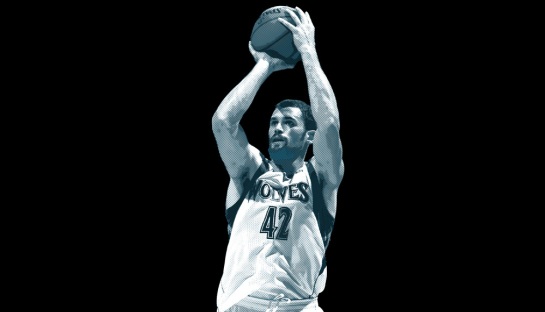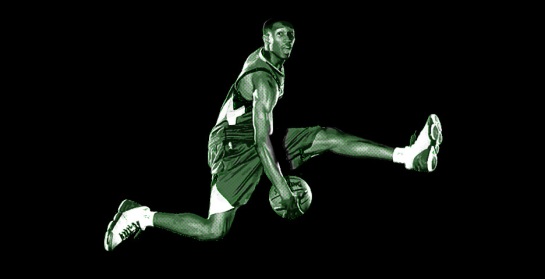 So once again I was lucky enough to sit courtside for what turned out to be not-a-trainwreck between the Oklahoma City Thunder and the Timberwolves last night. The final score of 115-110 was much better than my predicted 110-80 and the swoon I kept expecting in the second half never happened. It seemed like the halftime score of 59-58 simply indicated that the Thunder hadn’t yet decided to play defense, but even when they tried to step on the Wolves’ throat at the beginning of the third, said throat proved rather resilient.
So once again I was lucky enough to sit courtside for what turned out to be not-a-trainwreck between the Oklahoma City Thunder and the Timberwolves last night. The final score of 115-110 was much better than my predicted 110-80 and the swoon I kept expecting in the second half never happened. It seemed like the halftime score of 59-58 simply indicated that the Thunder hadn’t yet decided to play defense, but even when they tried to step on the Wolves’ throat at the beginning of the third, said throat proved rather resilient.
As Zach Harper pointed out, Barea and Westbrook couldn’t guard each other, with Barea ending up with 24 points and Westbrook 35. The Wolves’ best defender on Westbrook? Amazingly enough, it was Anthony Randolph, who managed to draw a charge late in the game that almost tipped things in the Wolves’ favor. Just prior to that play, Westbrook made a pretty thunderously dumb play. After Harden’s missed 3, Westbrook jumped up and literally grabbed Randolph’s arm as he was going for the rebound. Here’s the video:
[youtube http://www.youtube.com/watch?v=1yJ2ffZ4uxw]And here’s a still of the actual moment when he grabbed Randolph. Of particular note is the clock.
The Thunder were up 7 points with 49.6 seconds left and Westbrook is clearly outnumbered going for this rebound with three Timberwolves packed into the paint around him. One of Westbrook’s greatest strengths is his engine, his intensity, but here it gets him into trouble. Instead of letting the rebound go and forcing the Wolves to run time off the clock setting up a play, he stops the clock with the foul and sends Randolph to the line where he cuts the lead to 5. Then, on the ensuing play, Randolph draws the charge:
[youtube http://www.youtube.com/watch?v=fV44-jjBXGw]Although Westbrook at least takes some time off the clock, an iso play still doesn’t seem like the best option. You can see Kevin Durant set a screen, but Westbrook clearly sees the matchup against Randolph as a mismatch, but it doesn’t pay off. Michael Beasley’s layup on the next play cuts the lead to 5, but then immediately the Thunder take advantage of the Wolves not getting back and Durant gets an open lane to the basket for an emphatic dunk.
[youtube http://www.youtube.com/watch?v=x9qBGiZs9k8]You can see the confusion that settles quickly over the Wolves after Beasley’s impressive layup. As Kendrick Perkins goes to inbound the ball Randolph and Barea are doubling Westbrook, but where is Beasley going?

Durant is wide open near the sideline and Beasley is badly out of position to stop him. One hesitation dribble and he’s off. Durant might not be a speed demon like Westbrook, but he uses his speed well. If he had just gone flat-out for the hoop, he probably would have made it, but that hesitation gets Beasley off balance and lets Durant fly.
That whole sequence was pretty indicative of the game as a whole. The Thunder played solidly if a little loosely while the Wolves kept fighting and clawing, eventually scratching themselves in the process.
Two last things, courtesy of former NBA player Trent Tucker, whom I got to sit next to. At one point in the third quarter, Tucker called out to referee Dan Crawford. They exchanged greetings and then Crawford said, “Every time I see you, I think, ‘We have to watch replays because of you,’” in reference to the Trent Tucker Rule, which the league enacted because of a play where Tucker, then playing for the Knicks, caught an inbounds pass from Mark Jackson and hoisted a shot that won the game with a tenth of a second left on the clock. Now there must be at least three-tenths of a second left on the clock in order for a player to secure possession and take a shot.
Tucker kept pointing out during the game that Nikola Pekovic was playing too far off his man when Westbrook ran the pick and roll, allowing Westbrook to get clear looks at the basket from midrange. I went to the videotape and, sure enough, he’s right. Here you can see four examples of Pekovic shading too low to guard Westbrook once he gets by the screen:
[youtube http://www.youtube.com/watch?v=0Obq5FWC9A4]It seems to me this speaks to the looseness of the Wolves without anchors like Love and Rubio. Playing with lineups that they’re not used to, it seems like the Wolves’ players are less sure of their roles and what each of them should be doing at any given time. It’s no great time to give Westbrook the midrange jumper since he’s not a great jump shooter, but he’s also not Rajon Rondo; he can hit them. Plus, the Thunder rely so heavily on Durant and Westbrook, why not leave Kendrick Perkins and turn Westbrook into a passer? When the starters go down, it seems like the pieces don’t interlock as well, the rotations aren’t as crisp. The team as a whole looks a little more provisional, like they’ve just been thrown together. Kudos to them for showing some fight against the presumptive Western Conference champs, but it’s hard to know what to make of a game like that. The best Wolves fans can hope for is that this last batch of games gives the team a better idea of whom to keep and whom to let go this offseason.
—Steve McPherson









